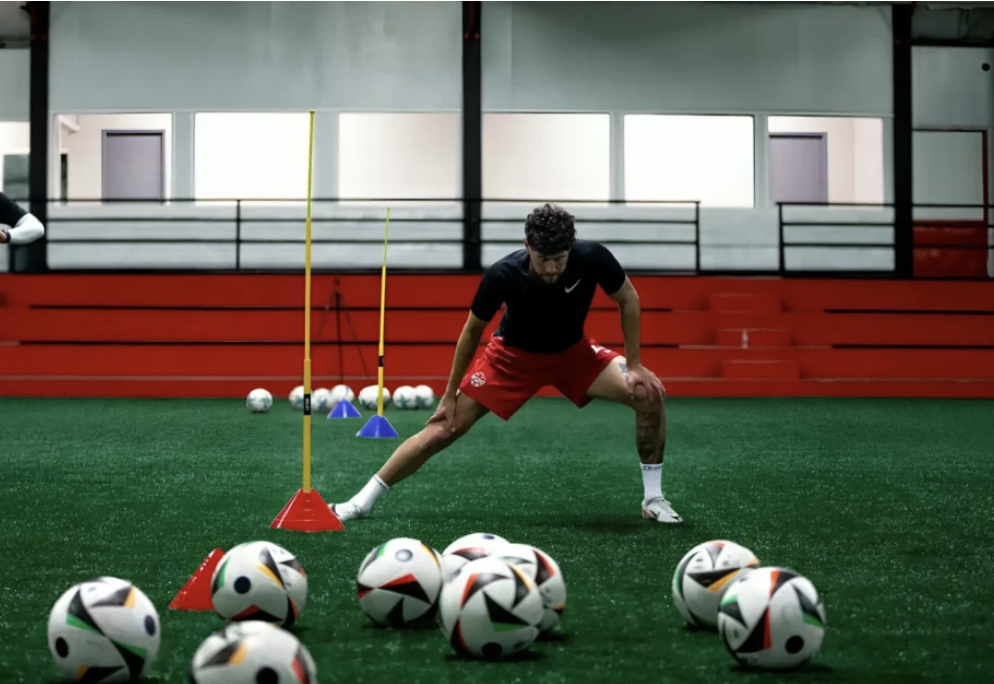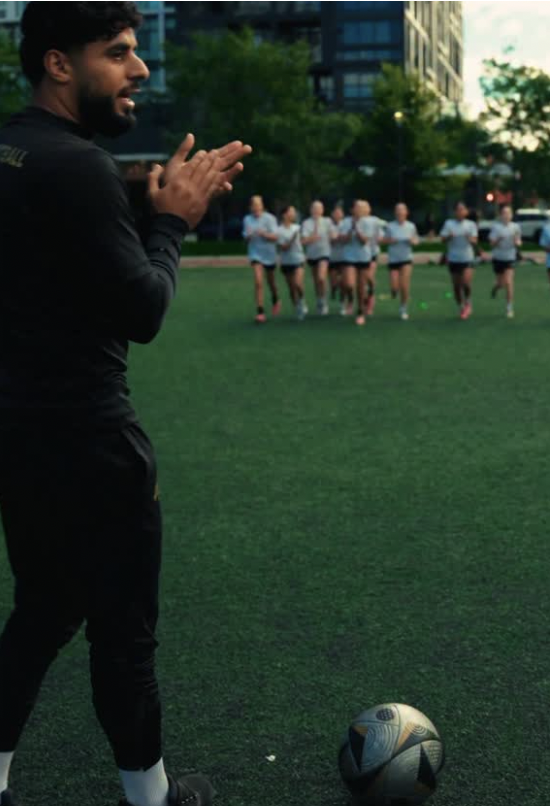- info@absolutefootballtraining.com
- Toronto, Ontario

Finding the right soccer training program for your child in Toronto can feel overwhelming. With dozens of academies, clubs, and training centers across the GTA, how do you know which one will truly help your young athlete reach their potential? As a parent, you want to make an informed decision that sets your child up for success both on and off the field.
Whether your child is just starting their soccer journey or looking to take their skills to the next level, this comprehensive guide will walk you through everything you need to know about choosing the best soccer training program in Toronto.
Before diving into your search, take time to honestly assess where your child stands today. Are they a complete beginner who’s never touched a soccer ball, or do they already have some experience from school or recreational play? Understanding their current abilities helps you narrow down programs that match their development stage.

Equally important is understanding what your child wants to achieve. Some kids simply want to have fun and make friends, while others dream of playing for their high school team or even pursuing soccer scholarships.
Talk openly with your child about their interests. Do they prefer individual skill development or team-based activities? Are they motivated by competition or do they thrive in more supportive, non-competitive environments? These conversations will guide you toward programs that align with their personality and aspirations.
Toronto’s soccer landscape is defined by Toronto FC, its MLS team, which is undergoing infrastructure upgrades at BMO Field in anticipation of hosting FIFA World Cup 2026 matches. The city also supports a robust development system with the TFC Academy and TFC II, and League1 Ontario, a semi-professional league. The introduction of a new professional women’s team, AFC Toronto City, in 2025, signals growing investment and interest in the sport at all levels.
Professional Level
Player Development and Grassroots
The Greater Toronto Area also benefits from a year-round soccer season thanks to numerous indoor facilities, allowing players to develop consistently regardless of weather. This gives Toronto-based players a significant advantage over those in many other Canadian cities where outdoor-only programs limit winter training opportunities.
Dedicated Indoor Soccer Facilities
Community and Municipal Facilities
The coaching staff can make or break your child’s soccer experience. Look for programs where coaches hold recognized certifications from organizations like Soccer Canada or UEFA. More importantly, observe how coaches interact with players during trial sessions or practices.
At Absolute Football Training (AFT), founder Abz Elchanti brings exceptional credentials to the program. As a former TMU (Toronto Metropolitan University) player who also went overseas to Sweden to play professionally, his soccer knowledge runs incredibly deep. This combination of local university experience and international professional play provides a unique perspective that benefits players at all levels.

Great youth coaches possess patience, clear communication skills, and the ability to make learning fun while maintaining appropriate expectations. They should focus on individual player development rather than just winning games, especially for younger age groups.
Different programs emphasize different aspects of soccer development. Some focus heavily on technical skills like dribbling and ball control, while others prioritize tactical understanding or physical conditioning. The best programs for youth players typically follow a holistic approach that develops technical, tactical, physical, and psychological aspects of the game.
AFT showcases their comprehensive training methodology through their Instagram page (@absolutefootballtraining), where you can find numerous videos demonstrating how they teach different skills and techniques. This transparency allows parents and players to see exactly what training methods they use before committing to the program.
Soccer training in Toronto should emphasize age-appropriate development. For players under 12, look for programs that prioritize fun, creativity, and basic skill development over rigid tactical systems or excessive competition.
Quality facilities don’t guarantee quality coaching, but they do indicate a program’s commitment to providing the best possible experience. When evaluating facilities, consider:
The training environment should feel positive and inclusive. Watch for programs where players of different skill levels are encouraged and supported, not just the most talented athletes.
Smaller group sizes typically mean more individual attention for your child. For technical skill development, ratios of 8-12 players per coach work well. For tactical training with older players, slightly larger groups may be appropriate, but avoid programs with more than 16 players per coach as individual development often suffers.
AFT demonstrates their commitment to quality coaching ratios in their recent Instagram post (https://www.instagram.com/p/DNZBdekx_Zq/), showing their hands-on approach to individual player development with optimal group sizes that ensure every player receives proper attention and feedback.
At this age, the primary goals should be developing a love for the game and basic movement skills. Look for programs that incorporate games, storytelling, and creative activities rather than structured drills or competitive matches.
This is the golden age for learning soccer techniques. AFT’s Instagram showcases exactly this approach with specialized content focused on skill development for this crucial age group. Their posts demonstrate various training methods including “Want to Improve Your Shooting?”, “Want to Improve in Tight Spaces?”, “Want to Improve Your Passing?”, “Want to Improve Your Touches?”, and “Want to Improve Your Ball Control?” – showing their comprehensive approach to technical development.
Our youth programs at this level should emphasize ball mastery, basic passing and receiving, and simple tactical concepts through fun, game-based activities.
Older players can handle more complex tactical concepts and may benefit from position-specific training. Competitive elements become more appropriate, but development should still take priority over winning.
AFT is positioning itself to set apart from traditional soccer programs by developing into a comprehensive professional soccer academy that serves players from beginners all the way to advanced levels. This full-spectrum approach means they can grow with your child, providing continuity in coaching philosophy and training methodology as players progress through different developmental stages.
These community-based programs focus on participation, fun, and basic skill development. They’re perfect for beginners or players who prefer a less competitive atmosphere.
For players seeking higher-level competition, club teams offer more intensive training and participate in organized leagues. These programs typically require greater time and financial commitments but provide accelerated development opportunities.
High-performance academies cater to players with professional aspirations. These programs offer the highest level of coaching and competition but require significant dedication and investment.
Some programs focus specifically on individual skill development through small group or private sessions. These can complement team-based training and are particularly valuable for players looking to improve specific aspects of their game.

Soccer training costs in Toronto vary significantly, ranging from roughly $30-$50/hour for private coaching to $300-$1,300+ for full season club programs, which include multiple sessions, uniforms, and potential affiliate fees. Key factors influencing the price are the type of program (private vs. group), the length of the season, the level of play (recreational vs. competitive), and the specific club or provider.
Typical Cost Ranges
Factors Affecting Cost
Examples
When evaluating cost, consider the total value package:
Remember that the most expensive program isn’t necessarily the best fit for your child. Focus on finding programs that offer excellent value for your specific needs and budget.
Before committing to any program, ask these essential questions:
Be cautious of programs that:
After researching options and visiting potential programs, trust your instincts. The right program should align with your child’s goals, your family’s schedule and budget, and most importantly, should be a place where your child feels excited to learn and improve.
Consider starting with trial periods or shorter commitments before making long-term decisions. Many quality programs offer trial sessions or short-term camps that let you and your child experience their approach firsthand.
Remember that your child’s needs may change as they grow and develop. What works for a 7-year-old beginner may not be appropriate for the same player at age 12. Stay flexible and be prepared to reassess your choice periodically.
Regular communication with coaches and honest conversations with your child about their experience will help you determine if adjustments are needed. The best Toronto football coaching programs welcome parent feedback and work collaboratively to ensure each player’s success.
Choosing the right soccer training program is one of the most important decisions you’ll make in your child’s athletic journey. By taking time to understand your options and carefully evaluating programs against your child’s specific needs, you’ll set them up for years of enjoyment and growth in the beautiful game.
Share this article
Recent Posts
Expert coaching for all skill levels, fostering growth, teamwork, and confidence through tailored sessions and dynamic learning environments.
+1 635-698-2541
info@absolutefootballtraining.com
Upcoming Events
Expert coaching for all skill levels, fostering growth, teamwork, and confidence through tailored sessions and dynamic learning environments.